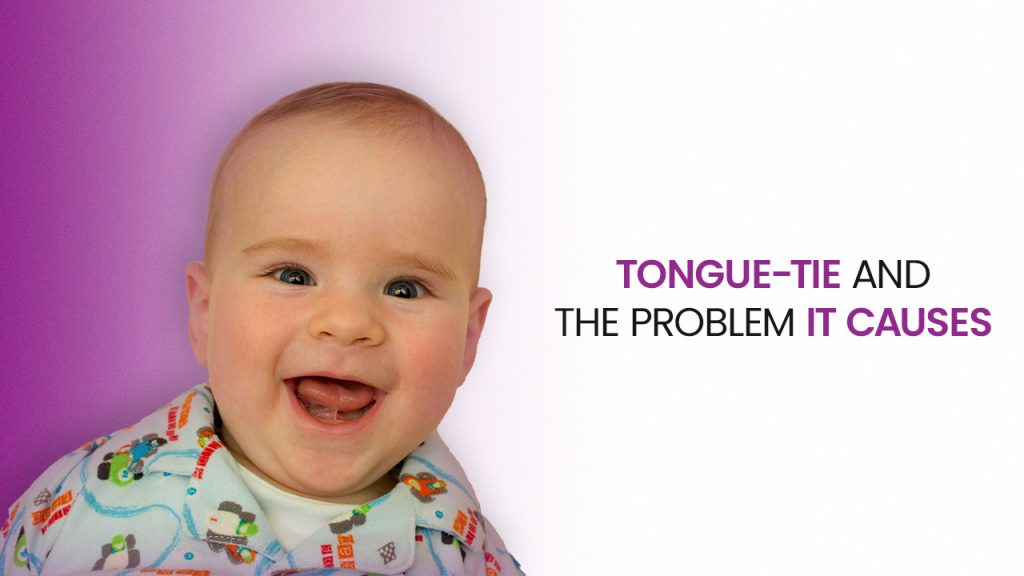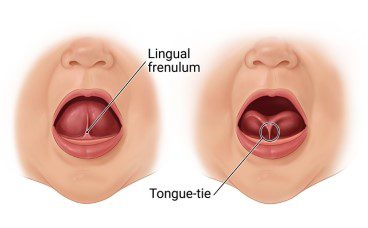What is Tongue Tie actually?
Tongue tie, which is also known as ankyloglossia, is a condition that restricts the tongue’s range of movement. The condition is present from birth. About 4% to 11% of babies are born with tongue ties.
Causes of Tongue Tie
There are mainly two reasons for tongue-tie: either the frenum is overly short or tight, or it didn’t move back down the tongue during expansion and is still attached to the tongue tip. The tongue and the floor of the mouth fuse together in the womb. With time, the tongue separates from the floor of the mouth. In the course of time, only a thin band of tissue (the lingual frenulum) connects the bottom of the tongue to the floor of the mouth. As the baby grows, the band of tissue under the tongue shrinks and thins. But for some children the band of tissue remains thick, making it difficult for them to move the tongue. There are many adults and children who will not have any problem despite having a short, tight lingual frenum.
Signs of Tongue Tie
- Delayed in developing speech
- Stammering
- Being choosy about eating specific textures
- Incapability to cleanse teeth with tongue
- Congestion and sinus trouble
- Breathing from mouth
- Having sleeping problems like making the bed wet, snoring, and sleep apnea
- Facing difficulty in swallowing
- Difficulty in licking ice cream or candy
- Difficulty in sticking their tongue up and out
- Troubling in gaining weight
- Constantly feeling hunger
Tongue Tie and Problems With Baby Feeding
Breastfeeding issues can be associated with tongue-tie but the condition can be hard to diagnose in infants and numerous of the symptoms of a tongue tie also come with other feeding issues. Thus, it’s really important to see your dentist as early as possible. It’s also important to remember that most breastfeeding problems aren’t caused by tongue-tie and can be overcome with accurate support.
Tongue Tie and Problems With Speech
Several children may develop speech problems because of tongue-tie. Though the true impact of it on speech isn’t still clearly understood. The tongue needs to contact the roof of the mouth when pronouncing sounds like- “t”, “z”, “d”, “s”, “th”, and “I”. So, when the tongue is restricted to reach the roof of the mouth then your child may have problems with pronunciation.
What Will Happen if the Tongue Tie is Left Untreated
The tongue is an important part of the human body as it plays an important role in proper facial development. So, if tongue tie is left untreated, it can seriously affect the baby’s growth, speech, and smile, as well as:
- Chewing- those with tongue tie face problems with jaw joints, making it much harder to eat.
- Hearing and breathing- untreated tongue-tie can stop airways and affect swallowing, which causes mucus build-up and repeated ear infections.
- Crooked teeth- the tongue helps shape arches which leads to straighter teeth. So, when the tongue doesn’t have the mobility it requires, arch lengths are changed and shortened, resulting in a misaligned smile.
- Appearance- tongue tie can also lead to flattened cheekbones and retruded jaw.
Just remember all this information for your baby or other new members of your family.
It is suggested that tongue ties are released as soon as it is detected, to avoid any above mentioned problems











